Exploring Psychological and Socioeconomic Factors of Domestic Violence
VerifiedAdded on 2023/06/07
|10
|2474
|487
Essay
AI Summary
This essay examines the psychological and socioeconomic factors that contribute to domestic violence, a significant health and welfare issue in Australia. It highlights the prevalence of domestic violence across various demographics, citing statistics on affected women, children, and men. The essay delves into psychological factors such as the cycle of violence, where witnessing or experiencing abuse in childhood leads to its perpetuation in adulthood, and the belief in male dominance, which aligns with the feminist gender politics model. It also explores how victims often remain in abusive relationships due to fear, lack of support, and victim-blaming. Furthermore, the essay discusses the exchange or choice theory, suggesting that abusers choose their behavior based on perceived success. It also addresses the role of mental health issues in perpetrators. Socioeconomic factors, including cultural beliefs that subordinate women, financial insecurity, unemployment, and societal stress, are examined as contributors to domestic violence. The essay concludes by emphasizing the importance of healthcare professionals understanding these factors to effectively intervene and support both victims and perpetrators, while also noting the various emotional and mental health issues that victims may face.
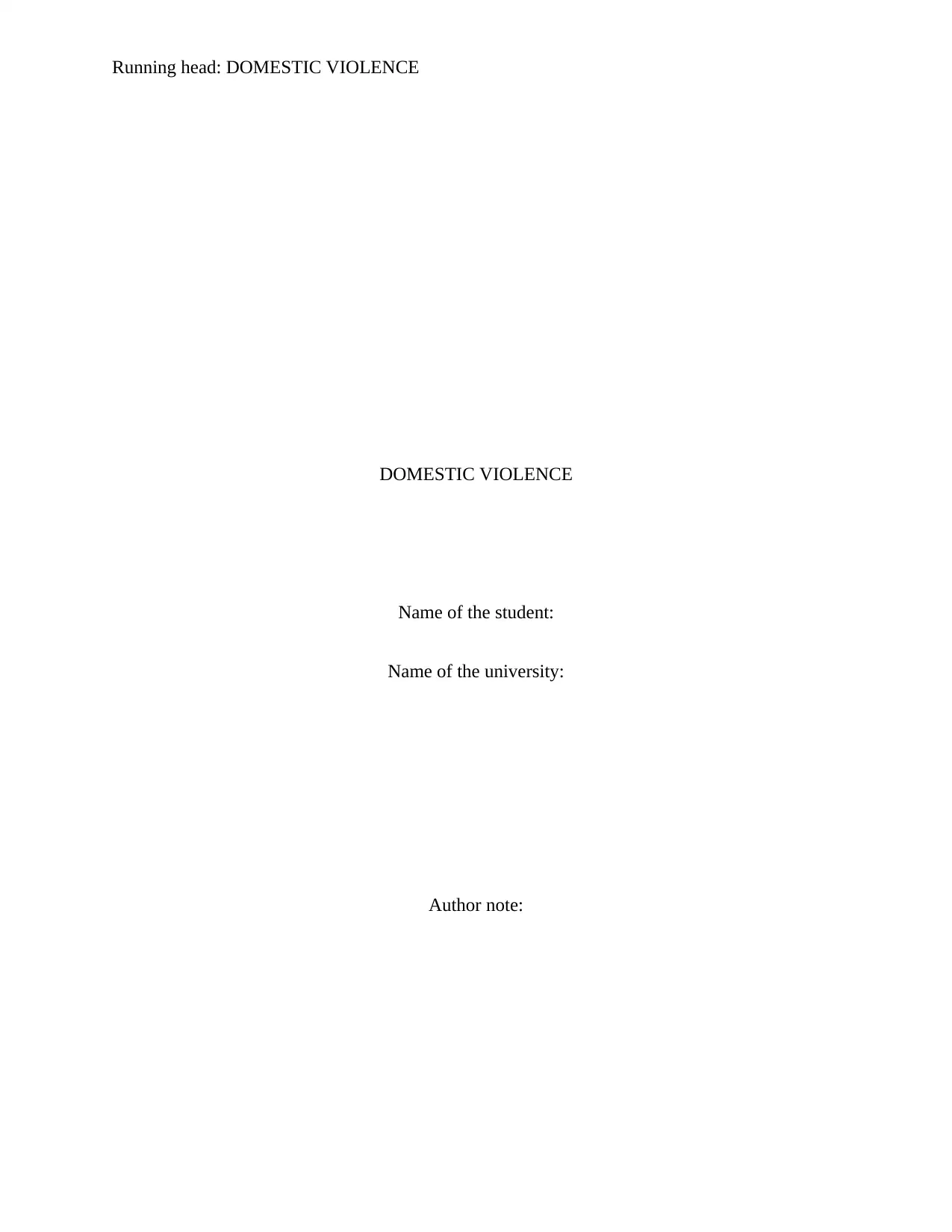
Running head: DOMESTIC VIOLENCE
DOMESTIC VIOLENCE
Name of the student:
Name of the university:
Author note:
DOMESTIC VIOLENCE
Name of the student:
Name of the university:
Author note:
Paraphrase This Document
Need a fresh take? Get an instant paraphrase of this document with our AI Paraphraser
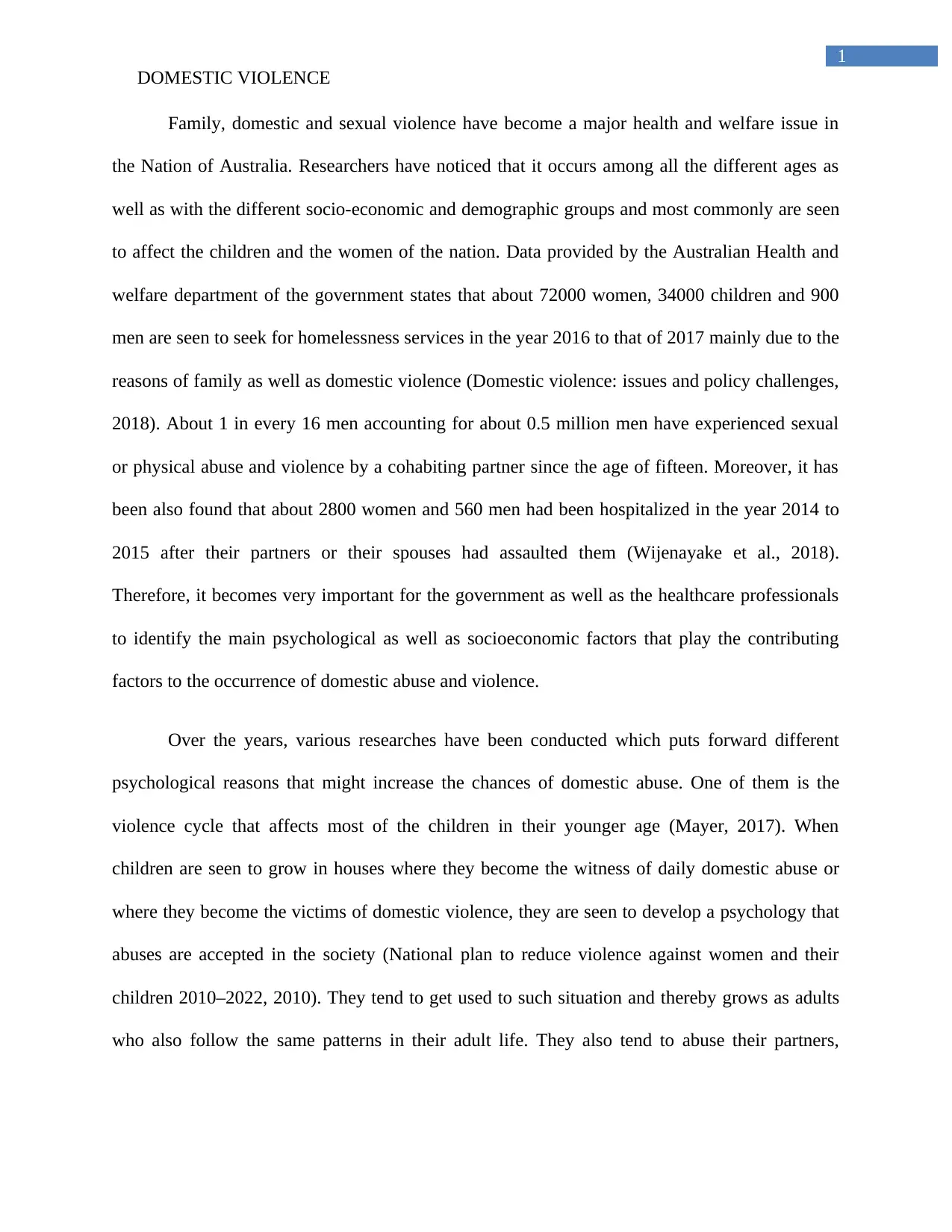
1
DOMESTIC VIOLENCE
Family, domestic and sexual violence have become a major health and welfare issue in
the Nation of Australia. Researchers have noticed that it occurs among all the different ages as
well as with the different socio-economic and demographic groups and most commonly are seen
to affect the children and the women of the nation. Data provided by the Australian Health and
welfare department of the government states that about 72000 women, 34000 children and 900
men are seen to seek for homelessness services in the year 2016 to that of 2017 mainly due to the
reasons of family as well as domestic violence (Domestic violence: issues and policy challenges,
2018). About 1 in every 16 men accounting for about 0.5 million men have experienced sexual
or physical abuse and violence by a cohabiting partner since the age of fifteen. Moreover, it has
been also found that about 2800 women and 560 men had been hospitalized in the year 2014 to
2015 after their partners or their spouses had assaulted them (Wijenayake et al., 2018).
Therefore, it becomes very important for the government as well as the healthcare professionals
to identify the main psychological as well as socioeconomic factors that play the contributing
factors to the occurrence of domestic abuse and violence.
Over the years, various researches have been conducted which puts forward different
psychological reasons that might increase the chances of domestic abuse. One of them is the
violence cycle that affects most of the children in their younger age (Mayer, 2017). When
children are seen to grow in houses where they become the witness of daily domestic abuse or
where they become the victims of domestic violence, they are seen to develop a psychology that
abuses are accepted in the society (National plan to reduce violence against women and their
children 2010–2022, 2010). They tend to get used to such situation and thereby grows as adults
who also follow the same patterns in their adult life. They also tend to abuse their partners,
DOMESTIC VIOLENCE
Family, domestic and sexual violence have become a major health and welfare issue in
the Nation of Australia. Researchers have noticed that it occurs among all the different ages as
well as with the different socio-economic and demographic groups and most commonly are seen
to affect the children and the women of the nation. Data provided by the Australian Health and
welfare department of the government states that about 72000 women, 34000 children and 900
men are seen to seek for homelessness services in the year 2016 to that of 2017 mainly due to the
reasons of family as well as domestic violence (Domestic violence: issues and policy challenges,
2018). About 1 in every 16 men accounting for about 0.5 million men have experienced sexual
or physical abuse and violence by a cohabiting partner since the age of fifteen. Moreover, it has
been also found that about 2800 women and 560 men had been hospitalized in the year 2014 to
2015 after their partners or their spouses had assaulted them (Wijenayake et al., 2018).
Therefore, it becomes very important for the government as well as the healthcare professionals
to identify the main psychological as well as socioeconomic factors that play the contributing
factors to the occurrence of domestic abuse and violence.
Over the years, various researches have been conducted which puts forward different
psychological reasons that might increase the chances of domestic abuse. One of them is the
violence cycle that affects most of the children in their younger age (Mayer, 2017). When
children are seen to grow in houses where they become the witness of daily domestic abuse or
where they become the victims of domestic violence, they are seen to develop a psychology that
abuses are accepted in the society (National plan to reduce violence against women and their
children 2010–2022, 2010). They tend to get used to such situation and thereby grows as adults
who also follow the same patterns in their adult life. They also tend to abuse their partners,
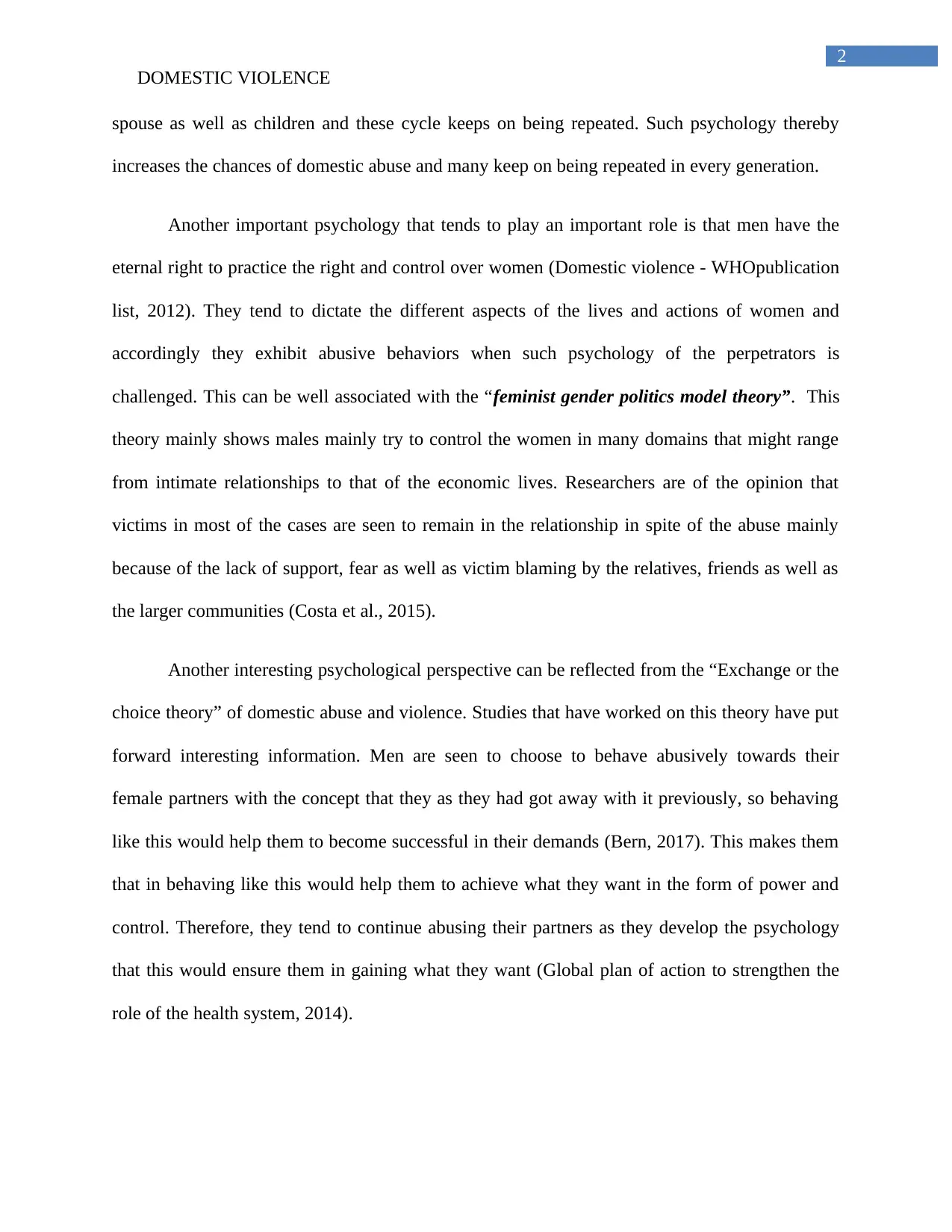
2
DOMESTIC VIOLENCE
spouse as well as children and these cycle keeps on being repeated. Such psychology thereby
increases the chances of domestic abuse and many keep on being repeated in every generation.
Another important psychology that tends to play an important role is that men have the
eternal right to practice the right and control over women (Domestic violence - WHOpublication
list, 2012). They tend to dictate the different aspects of the lives and actions of women and
accordingly they exhibit abusive behaviors when such psychology of the perpetrators is
challenged. This can be well associated with the “feminist gender politics model theory”. This
theory mainly shows males mainly try to control the women in many domains that might range
from intimate relationships to that of the economic lives. Researchers are of the opinion that
victims in most of the cases are seen to remain in the relationship in spite of the abuse mainly
because of the lack of support, fear as well as victim blaming by the relatives, friends as well as
the larger communities (Costa et al., 2015).
Another interesting psychological perspective can be reflected from the “Exchange or the
choice theory” of domestic abuse and violence. Studies that have worked on this theory have put
forward interesting information. Men are seen to choose to behave abusively towards their
female partners with the concept that they as they had got away with it previously, so behaving
like this would help them to become successful in their demands (Bern, 2017). This makes them
that in behaving like this would help them to achieve what they want in the form of power and
control. Therefore, they tend to continue abusing their partners as they develop the psychology
that this would ensure them in gaining what they want (Global plan of action to strengthen the
role of the health system, 2014).
DOMESTIC VIOLENCE
spouse as well as children and these cycle keeps on being repeated. Such psychology thereby
increases the chances of domestic abuse and many keep on being repeated in every generation.
Another important psychology that tends to play an important role is that men have the
eternal right to practice the right and control over women (Domestic violence - WHOpublication
list, 2012). They tend to dictate the different aspects of the lives and actions of women and
accordingly they exhibit abusive behaviors when such psychology of the perpetrators is
challenged. This can be well associated with the “feminist gender politics model theory”. This
theory mainly shows males mainly try to control the women in many domains that might range
from intimate relationships to that of the economic lives. Researchers are of the opinion that
victims in most of the cases are seen to remain in the relationship in spite of the abuse mainly
because of the lack of support, fear as well as victim blaming by the relatives, friends as well as
the larger communities (Costa et al., 2015).
Another interesting psychological perspective can be reflected from the “Exchange or the
choice theory” of domestic abuse and violence. Studies that have worked on this theory have put
forward interesting information. Men are seen to choose to behave abusively towards their
female partners with the concept that they as they had got away with it previously, so behaving
like this would help them to become successful in their demands (Bern, 2017). This makes them
that in behaving like this would help them to achieve what they want in the form of power and
control. Therefore, they tend to continue abusing their partners as they develop the psychology
that this would ensure them in gaining what they want (Global plan of action to strengthen the
role of the health system, 2014).
⊘ This is a preview!⊘
Do you want full access?
Subscribe today to unlock all pages.

Trusted by 1+ million students worldwide
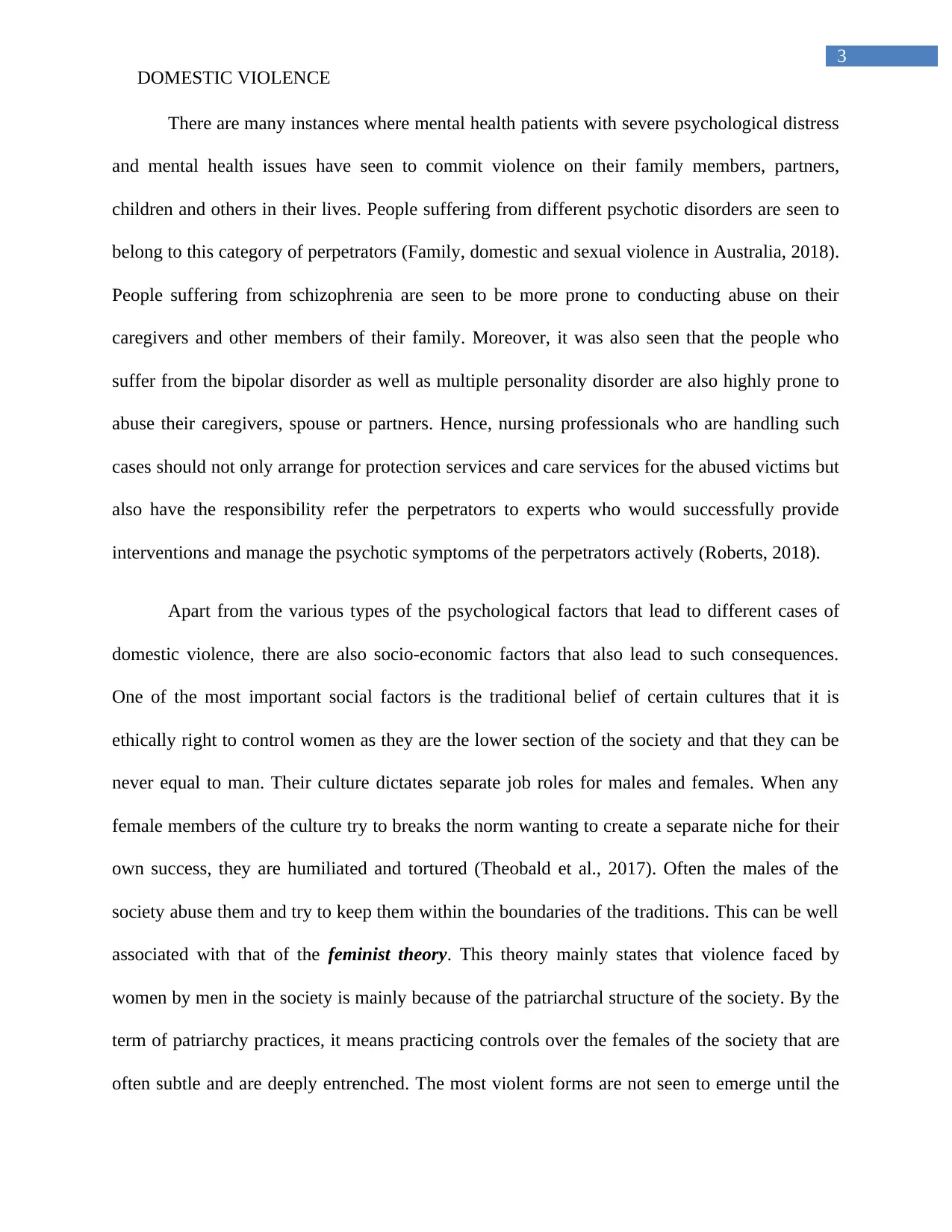
3
DOMESTIC VIOLENCE
There are many instances where mental health patients with severe psychological distress
and mental health issues have seen to commit violence on their family members, partners,
children and others in their lives. People suffering from different psychotic disorders are seen to
belong to this category of perpetrators (Family, domestic and sexual violence in Australia, 2018).
People suffering from schizophrenia are seen to be more prone to conducting abuse on their
caregivers and other members of their family. Moreover, it was also seen that the people who
suffer from the bipolar disorder as well as multiple personality disorder are also highly prone to
abuse their caregivers, spouse or partners. Hence, nursing professionals who are handling such
cases should not only arrange for protection services and care services for the abused victims but
also have the responsibility refer the perpetrators to experts who would successfully provide
interventions and manage the psychotic symptoms of the perpetrators actively (Roberts, 2018).
Apart from the various types of the psychological factors that lead to different cases of
domestic violence, there are also socio-economic factors that also lead to such consequences.
One of the most important social factors is the traditional belief of certain cultures that it is
ethically right to control women as they are the lower section of the society and that they can be
never equal to man. Their culture dictates separate job roles for males and females. When any
female members of the culture try to breaks the norm wanting to create a separate niche for their
own success, they are humiliated and tortured (Theobald et al., 2017). Often the males of the
society abuse them and try to keep them within the boundaries of the traditions. This can be well
associated with that of the feminist theory. This theory mainly states that violence faced by
women by men in the society is mainly because of the patriarchal structure of the society. By the
term of patriarchy practices, it means practicing controls over the females of the society that are
often subtle and are deeply entrenched. The most violent forms are not seen to emerge until the
DOMESTIC VIOLENCE
There are many instances where mental health patients with severe psychological distress
and mental health issues have seen to commit violence on their family members, partners,
children and others in their lives. People suffering from different psychotic disorders are seen to
belong to this category of perpetrators (Family, domestic and sexual violence in Australia, 2018).
People suffering from schizophrenia are seen to be more prone to conducting abuse on their
caregivers and other members of their family. Moreover, it was also seen that the people who
suffer from the bipolar disorder as well as multiple personality disorder are also highly prone to
abuse their caregivers, spouse or partners. Hence, nursing professionals who are handling such
cases should not only arrange for protection services and care services for the abused victims but
also have the responsibility refer the perpetrators to experts who would successfully provide
interventions and manage the psychotic symptoms of the perpetrators actively (Roberts, 2018).
Apart from the various types of the psychological factors that lead to different cases of
domestic violence, there are also socio-economic factors that also lead to such consequences.
One of the most important social factors is the traditional belief of certain cultures that it is
ethically right to control women as they are the lower section of the society and that they can be
never equal to man. Their culture dictates separate job roles for males and females. When any
female members of the culture try to breaks the norm wanting to create a separate niche for their
own success, they are humiliated and tortured (Theobald et al., 2017). Often the males of the
society abuse them and try to keep them within the boundaries of the traditions. This can be well
associated with that of the feminist theory. This theory mainly states that violence faced by
women by men in the society is mainly because of the patriarchal structure of the society. By the
term of patriarchy practices, it means practicing controls over the females of the society that are
often subtle and are deeply entrenched. The most violent forms are not seen to emerge until the
Paraphrase This Document
Need a fresh take? Get an instant paraphrase of this document with our AI Paraphraser
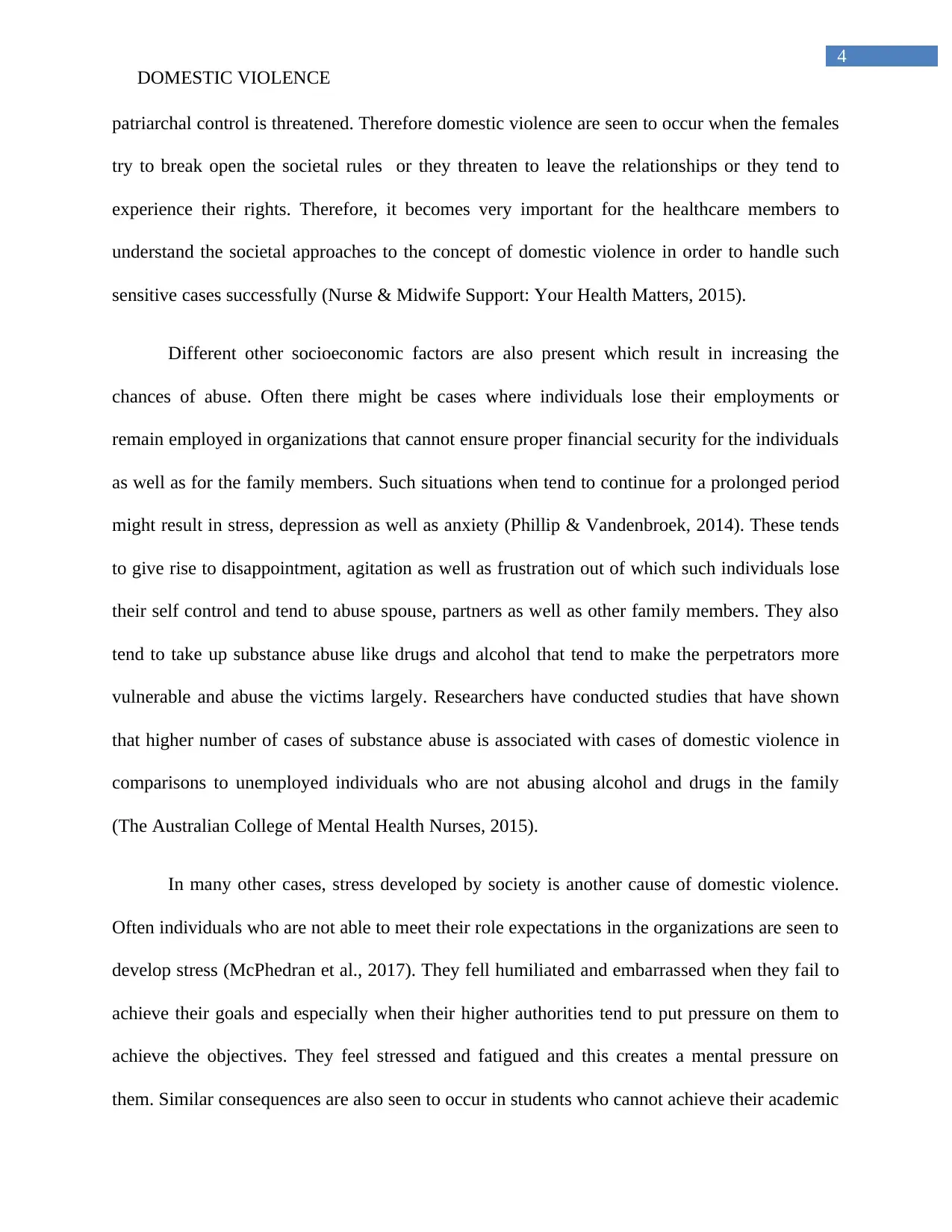
4
DOMESTIC VIOLENCE
patriarchal control is threatened. Therefore domestic violence are seen to occur when the females
try to break open the societal rules or they threaten to leave the relationships or they tend to
experience their rights. Therefore, it becomes very important for the healthcare members to
understand the societal approaches to the concept of domestic violence in order to handle such
sensitive cases successfully (Nurse & Midwife Support: Your Health Matters, 2015).
Different other socioeconomic factors are also present which result in increasing the
chances of abuse. Often there might be cases where individuals lose their employments or
remain employed in organizations that cannot ensure proper financial security for the individuals
as well as for the family members. Such situations when tend to continue for a prolonged period
might result in stress, depression as well as anxiety (Phillip & Vandenbroek, 2014). These tends
to give rise to disappointment, agitation as well as frustration out of which such individuals lose
their self control and tend to abuse spouse, partners as well as other family members. They also
tend to take up substance abuse like drugs and alcohol that tend to make the perpetrators more
vulnerable and abuse the victims largely. Researchers have conducted studies that have shown
that higher number of cases of substance abuse is associated with cases of domestic violence in
comparisons to unemployed individuals who are not abusing alcohol and drugs in the family
(The Australian College of Mental Health Nurses, 2015).
In many other cases, stress developed by society is another cause of domestic violence.
Often individuals who are not able to meet their role expectations in the organizations are seen to
develop stress (McPhedran et al., 2017). They fell humiliated and embarrassed when they fail to
achieve their goals and especially when their higher authorities tend to put pressure on them to
achieve the objectives. They feel stressed and fatigued and this creates a mental pressure on
them. Similar consequences are also seen to occur in students who cannot achieve their academic
DOMESTIC VIOLENCE
patriarchal control is threatened. Therefore domestic violence are seen to occur when the females
try to break open the societal rules or they threaten to leave the relationships or they tend to
experience their rights. Therefore, it becomes very important for the healthcare members to
understand the societal approaches to the concept of domestic violence in order to handle such
sensitive cases successfully (Nurse & Midwife Support: Your Health Matters, 2015).
Different other socioeconomic factors are also present which result in increasing the
chances of abuse. Often there might be cases where individuals lose their employments or
remain employed in organizations that cannot ensure proper financial security for the individuals
as well as for the family members. Such situations when tend to continue for a prolonged period
might result in stress, depression as well as anxiety (Phillip & Vandenbroek, 2014). These tends
to give rise to disappointment, agitation as well as frustration out of which such individuals lose
their self control and tend to abuse spouse, partners as well as other family members. They also
tend to take up substance abuse like drugs and alcohol that tend to make the perpetrators more
vulnerable and abuse the victims largely. Researchers have conducted studies that have shown
that higher number of cases of substance abuse is associated with cases of domestic violence in
comparisons to unemployed individuals who are not abusing alcohol and drugs in the family
(The Australian College of Mental Health Nurses, 2015).
In many other cases, stress developed by society is another cause of domestic violence.
Often individuals who are not able to meet their role expectations in the organizations are seen to
develop stress (McPhedran et al., 2017). They fell humiliated and embarrassed when they fail to
achieve their goals and especially when their higher authorities tend to put pressure on them to
achieve the objectives. They feel stressed and fatigued and this creates a mental pressure on
them. Similar consequences are also seen to occur in students who cannot achieve their academic
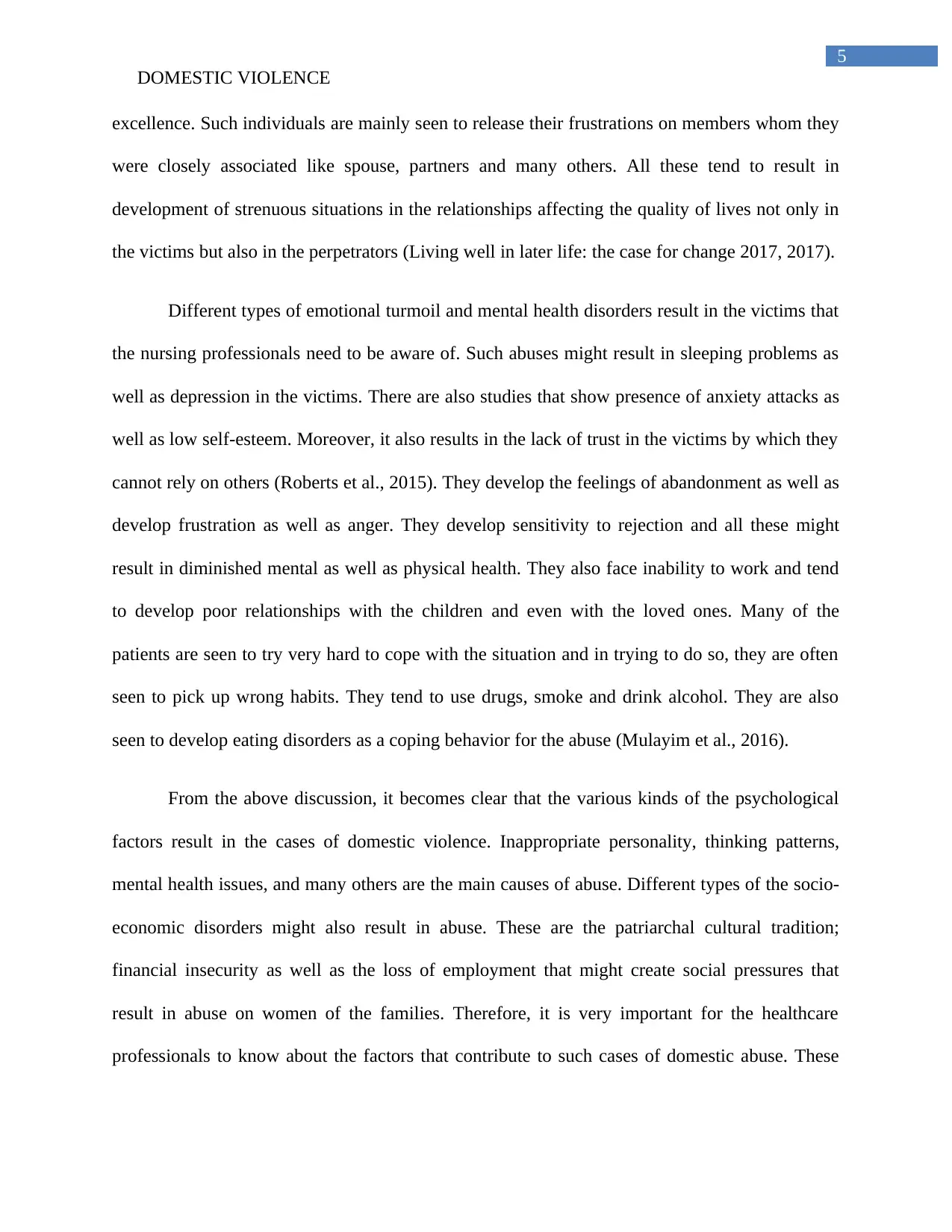
5
DOMESTIC VIOLENCE
excellence. Such individuals are mainly seen to release their frustrations on members whom they
were closely associated like spouse, partners and many others. All these tend to result in
development of strenuous situations in the relationships affecting the quality of lives not only in
the victims but also in the perpetrators (Living well in later life: the case for change 2017, 2017).
Different types of emotional turmoil and mental health disorders result in the victims that
the nursing professionals need to be aware of. Such abuses might result in sleeping problems as
well as depression in the victims. There are also studies that show presence of anxiety attacks as
well as low self-esteem. Moreover, it also results in the lack of trust in the victims by which they
cannot rely on others (Roberts et al., 2015). They develop the feelings of abandonment as well as
develop frustration as well as anger. They develop sensitivity to rejection and all these might
result in diminished mental as well as physical health. They also face inability to work and tend
to develop poor relationships with the children and even with the loved ones. Many of the
patients are seen to try very hard to cope with the situation and in trying to do so, they are often
seen to pick up wrong habits. They tend to use drugs, smoke and drink alcohol. They are also
seen to develop eating disorders as a coping behavior for the abuse (Mulayim et al., 2016).
From the above discussion, it becomes clear that the various kinds of the psychological
factors result in the cases of domestic violence. Inappropriate personality, thinking patterns,
mental health issues, and many others are the main causes of abuse. Different types of the socio-
economic disorders might also result in abuse. These are the patriarchal cultural tradition;
financial insecurity as well as the loss of employment that might create social pressures that
result in abuse on women of the families. Therefore, it is very important for the healthcare
professionals to know about the factors that contribute to such cases of domestic abuse. These
DOMESTIC VIOLENCE
excellence. Such individuals are mainly seen to release their frustrations on members whom they
were closely associated like spouse, partners and many others. All these tend to result in
development of strenuous situations in the relationships affecting the quality of lives not only in
the victims but also in the perpetrators (Living well in later life: the case for change 2017, 2017).
Different types of emotional turmoil and mental health disorders result in the victims that
the nursing professionals need to be aware of. Such abuses might result in sleeping problems as
well as depression in the victims. There are also studies that show presence of anxiety attacks as
well as low self-esteem. Moreover, it also results in the lack of trust in the victims by which they
cannot rely on others (Roberts et al., 2015). They develop the feelings of abandonment as well as
develop frustration as well as anger. They develop sensitivity to rejection and all these might
result in diminished mental as well as physical health. They also face inability to work and tend
to develop poor relationships with the children and even with the loved ones. Many of the
patients are seen to try very hard to cope with the situation and in trying to do so, they are often
seen to pick up wrong habits. They tend to use drugs, smoke and drink alcohol. They are also
seen to develop eating disorders as a coping behavior for the abuse (Mulayim et al., 2016).
From the above discussion, it becomes clear that the various kinds of the psychological
factors result in the cases of domestic violence. Inappropriate personality, thinking patterns,
mental health issues, and many others are the main causes of abuse. Different types of the socio-
economic disorders might also result in abuse. These are the patriarchal cultural tradition;
financial insecurity as well as the loss of employment that might create social pressures that
result in abuse on women of the families. Therefore, it is very important for the healthcare
professionals to know about the factors that contribute to such cases of domestic abuse. These
⊘ This is a preview!⊘
Do you want full access?
Subscribe today to unlock all pages.

Trusted by 1+ million students worldwide

6
DOMESTIC VIOLENCE
would help them to understand the psychology of both the victims and the perpetrators and these
would help them to take interventions accordingly.
DOMESTIC VIOLENCE
would help them to understand the psychology of both the victims and the perpetrators and these
would help them to take interventions accordingly.
Paraphrase This Document
Need a fresh take? Get an instant paraphrase of this document with our AI Paraphraser
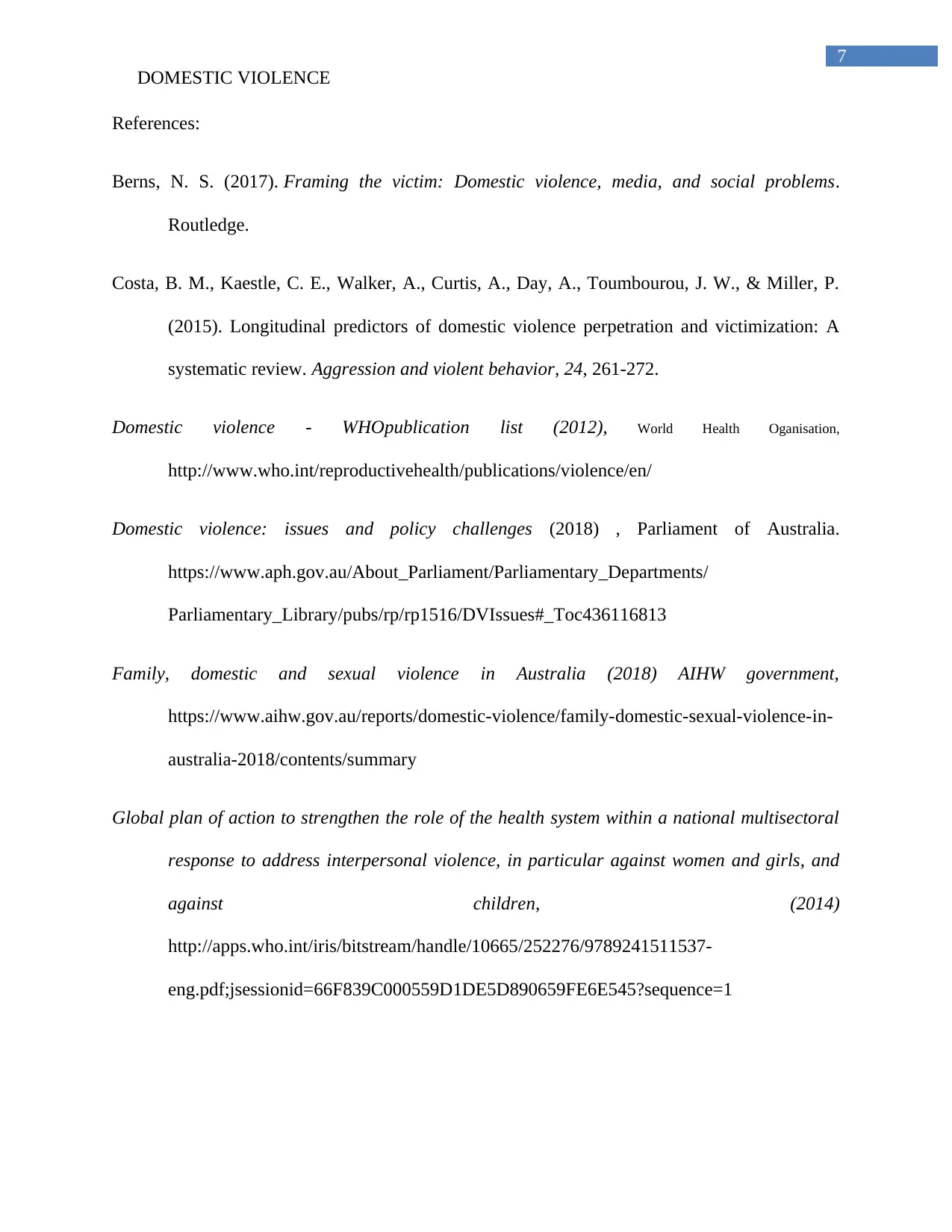
7
DOMESTIC VIOLENCE
References:
Berns, N. S. (2017). Framing the victim: Domestic violence, media, and social problems.
Routledge.
Costa, B. M., Kaestle, C. E., Walker, A., Curtis, A., Day, A., Toumbourou, J. W., & Miller, P.
(2015). Longitudinal predictors of domestic violence perpetration and victimization: A
systematic review. Aggression and violent behavior, 24, 261-272.
Domestic violence - WHOpublication list (2012), World Health Oganisation,
http://www.who.int/reproductivehealth/publications/violence/en/
Domestic violence: issues and policy challenges (2018) , Parliament of Australia.
https://www.aph.gov.au/About_Parliament/Parliamentary_Departments/
Parliamentary_Library/pubs/rp/rp1516/DVIssues#_Toc436116813
Family, domestic and sexual violence in Australia (2018) AIHW government,
https://www.aihw.gov.au/reports/domestic-violence/family-domestic-sexual-violence-in-
australia-2018/contents/summary
Global plan of action to strengthen the role of the health system within a national multisectoral
response to address interpersonal violence, in particular against women and girls, and
against children, (2014)
http://apps.who.int/iris/bitstream/handle/10665/252276/9789241511537-
eng.pdf;jsessionid=66F839C000559D1DE5D890659FE6E545?sequence=1
DOMESTIC VIOLENCE
References:
Berns, N. S. (2017). Framing the victim: Domestic violence, media, and social problems.
Routledge.
Costa, B. M., Kaestle, C. E., Walker, A., Curtis, A., Day, A., Toumbourou, J. W., & Miller, P.
(2015). Longitudinal predictors of domestic violence perpetration and victimization: A
systematic review. Aggression and violent behavior, 24, 261-272.
Domestic violence - WHOpublication list (2012), World Health Oganisation,
http://www.who.int/reproductivehealth/publications/violence/en/
Domestic violence: issues and policy challenges (2018) , Parliament of Australia.
https://www.aph.gov.au/About_Parliament/Parliamentary_Departments/
Parliamentary_Library/pubs/rp/rp1516/DVIssues#_Toc436116813
Family, domestic and sexual violence in Australia (2018) AIHW government,
https://www.aihw.gov.au/reports/domestic-violence/family-domestic-sexual-violence-in-
australia-2018/contents/summary
Global plan of action to strengthen the role of the health system within a national multisectoral
response to address interpersonal violence, in particular against women and girls, and
against children, (2014)
http://apps.who.int/iris/bitstream/handle/10665/252276/9789241511537-
eng.pdf;jsessionid=66F839C000559D1DE5D890659FE6E545?sequence=1
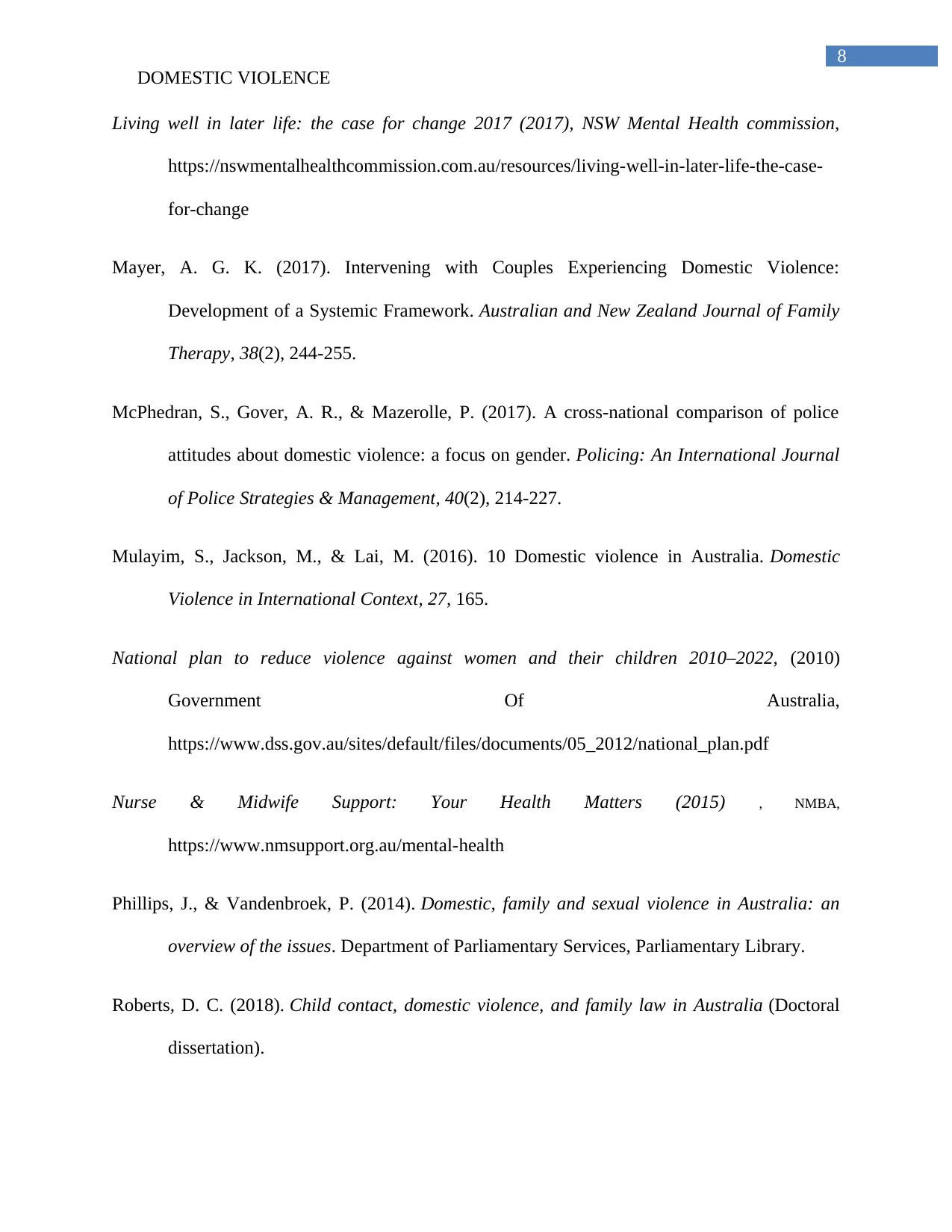
8
DOMESTIC VIOLENCE
Living well in later life: the case for change 2017 (2017), NSW Mental Health commission,
https://nswmentalhealthcommission.com.au/resources/living-well-in-later-life-the-case-
for-change
Mayer, A. G. K. (2017). Intervening with Couples Experiencing Domestic Violence:
Development of a Systemic Framework. Australian and New Zealand Journal of Family
Therapy, 38(2), 244-255.
McPhedran, S., Gover, A. R., & Mazerolle, P. (2017). A cross-national comparison of police
attitudes about domestic violence: a focus on gender. Policing: An International Journal
of Police Strategies & Management, 40(2), 214-227.
Mulayim, S., Jackson, M., & Lai, M. (2016). 10 Domestic violence in Australia. Domestic
Violence in International Context, 27, 165.
National plan to reduce violence against women and their children 2010–2022, (2010)
Government Of Australia,
https://www.dss.gov.au/sites/default/files/documents/05_2012/national_plan.pdf
Nurse & Midwife Support: Your Health Matters (2015) , NMBA,
https://www.nmsupport.org.au/mental-health
Phillips, J., & Vandenbroek, P. (2014). Domestic, family and sexual violence in Australia: an
overview of the issues. Department of Parliamentary Services, Parliamentary Library.
Roberts, D. C. (2018). Child contact, domestic violence, and family law in Australia (Doctoral
dissertation).
DOMESTIC VIOLENCE
Living well in later life: the case for change 2017 (2017), NSW Mental Health commission,
https://nswmentalhealthcommission.com.au/resources/living-well-in-later-life-the-case-
for-change
Mayer, A. G. K. (2017). Intervening with Couples Experiencing Domestic Violence:
Development of a Systemic Framework. Australian and New Zealand Journal of Family
Therapy, 38(2), 244-255.
McPhedran, S., Gover, A. R., & Mazerolle, P. (2017). A cross-national comparison of police
attitudes about domestic violence: a focus on gender. Policing: An International Journal
of Police Strategies & Management, 40(2), 214-227.
Mulayim, S., Jackson, M., & Lai, M. (2016). 10 Domestic violence in Australia. Domestic
Violence in International Context, 27, 165.
National plan to reduce violence against women and their children 2010–2022, (2010)
Government Of Australia,
https://www.dss.gov.au/sites/default/files/documents/05_2012/national_plan.pdf
Nurse & Midwife Support: Your Health Matters (2015) , NMBA,
https://www.nmsupport.org.au/mental-health
Phillips, J., & Vandenbroek, P. (2014). Domestic, family and sexual violence in Australia: an
overview of the issues. Department of Parliamentary Services, Parliamentary Library.
Roberts, D. C. (2018). Child contact, domestic violence, and family law in Australia (Doctoral
dissertation).
⊘ This is a preview!⊘
Do you want full access?
Subscribe today to unlock all pages.

Trusted by 1+ million students worldwide
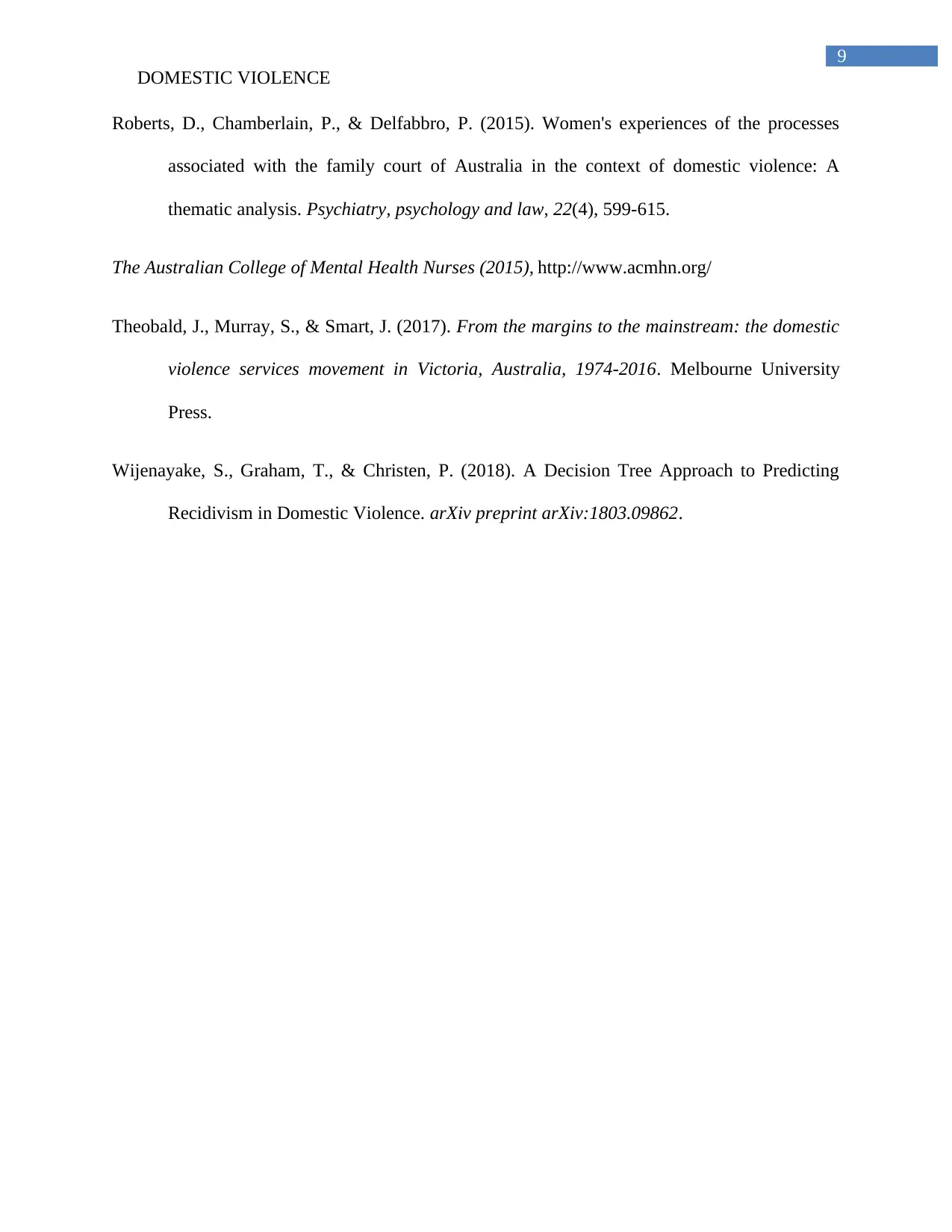
9
DOMESTIC VIOLENCE
Roberts, D., Chamberlain, P., & Delfabbro, P. (2015). Women's experiences of the processes
associated with the family court of Australia in the context of domestic violence: A
thematic analysis. Psychiatry, psychology and law, 22(4), 599-615.
The Australian College of Mental Health Nurses (2015), http://www.acmhn.org/
Theobald, J., Murray, S., & Smart, J. (2017). From the margins to the mainstream: the domestic
violence services movement in Victoria, Australia, 1974-2016. Melbourne University
Press.
Wijenayake, S., Graham, T., & Christen, P. (2018). A Decision Tree Approach to Predicting
Recidivism in Domestic Violence. arXiv preprint arXiv:1803.09862.
DOMESTIC VIOLENCE
Roberts, D., Chamberlain, P., & Delfabbro, P. (2015). Women's experiences of the processes
associated with the family court of Australia in the context of domestic violence: A
thematic analysis. Psychiatry, psychology and law, 22(4), 599-615.
The Australian College of Mental Health Nurses (2015), http://www.acmhn.org/
Theobald, J., Murray, S., & Smart, J. (2017). From the margins to the mainstream: the domestic
violence services movement in Victoria, Australia, 1974-2016. Melbourne University
Press.
Wijenayake, S., Graham, T., & Christen, P. (2018). A Decision Tree Approach to Predicting
Recidivism in Domestic Violence. arXiv preprint arXiv:1803.09862.
1 out of 10
Related Documents
Your All-in-One AI-Powered Toolkit for Academic Success.
+13062052269
info@desklib.com
Available 24*7 on WhatsApp / Email
![[object Object]](/_next/static/media/star-bottom.7253800d.svg)
Unlock your academic potential
Copyright © 2020–2026 A2Z Services. All Rights Reserved. Developed and managed by ZUCOL.



